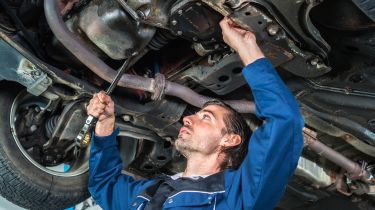Does your car make a rattling noise? Here's what to do
Does your car has a rattle or vibration that's driving you to distraction? We look into the most common causes and how you can solve them

Short of a particularly grating pop song appearing on the radio, a rattle is one of the most irritating sounds you’ll hear in a car. There you are, driving along in blissful silence, before all of a sudden, your ears are assaulted by an irritating buzz. Infuriating, isn’t it?
Rattling noises in your car can happen at any time, and for any number of reasons. Below, we’ve explained why your car might be rattling, what some of the noises can be depending on where they’re originating from, and what you need to do to fix them.
Why is my car rattling?
A car is a very complex object, and one of the problems with complexity is the number of new and unusual ways in which something can fail. Individually there are hundreds, perhaps even thousands of parts of a car that could, if incorrectly fitted or broken, cause a rattling noise.
 Engine management light: what to do if it comes on
Engine management light: what to do if it comes on
Whatever the cause, the solution is, broadly speaking, the same: You should investigate what is causing the rattle, and if possible, get it fixed.
Different kinds of rattling noise
As hinted, there are many, many things that can cause a rattle in your car, and they can vary wildly in severity. Most of us will be familiar with the annoying buzzes, squeaks and rattles that can manifest within a car’s interior, creating the world’s worst orchestra as you’re driving down the road.
But when it comes to components under the car or in the engine bay, rattles can be a little more serious. Below, we’ve identified the major areas you’re likely to hear a rattle, what those noises could be, and what your course of action should be to fix them.
Interior rattles
Interior rattles are some of the least serious rattling noises you’re likely to hear in a car, but conversely, can also be some of the hardest to cure – and some of the most annoying, since you’re closest to the source of the noise!
Diagnosing interior rattles varies between the simple and the excruciatingly difficult. One of the best ways to start is by removing all loose items from inside various cubby holes and the glovebox and boot to see if that’s the source of a rattling noise – unless your car has fabric and rubber lining every gap, almost anything can tap against plastic and make an irritating din.
From there, things might get a little trickier. It’s not unusual for plastic trim to come slightly adrift, creating buzzes and rattles, but finding the source can be a nightmare. It’ll typically only happen while you’re driving, often only at certain speeds, at certain engine revs, on a particular road surface (made all the worse by the deteriorating quality of our roads), or when your stereo is on and the bass is making things vibrate. So you’ll most likely need a helper who can listen out, prodding bits of the dashboard and door cards until it stops. Broken window regulators can also cause the side glass to rattle in its frame.
Even if you identify an interior rattle, actually fixing it may not be easy. In an older car, deconstructing parts of the interior wasn’t too difficult, but getting under the skin of modern ones can feel like a house renovation. If you’re lucky, a few well-chosen bits of felt may be enough to quell a rattle. If you’re unlucky, you might be better off just living with it…
Exterior rattles
As with interior rattles, loose or badly-fitted components can create noises outside the car. And much as you’d do when tracking down interior sounds, a quick look around your car’s exterior to ensure there’s nothing obvious creating the noise is the best place to start.
Aftermarket components such as roof boxes may be one culprit. You should avoid driving around with a roof box on every day as it significantly increases fuel consumption (or in an electric car, decreases range), but if you do have one fitted, then make sure it’s secure, as the mountings may be clattering against your car’s roof rails. This sounds obvious, but if it’s supposed to be empty, make sure it actually is, and there’s not part of your holiday luggage still bouncing around inside.
Exterior trim may also work itself loose, particularly if you’ve had a bit of a parking bump recently. Most modern exterior trim is fitted to the body using plastic clips, which can either come adrift or break entirely, leaving parts to flap around in the wind. If the clips are still there then you may just be able to pop a bit of trim back into place, but if they’re broken, then you may need to look into replacement. Make sure things like mirrors, aerials, and wipers are secure too.
Underbody rattles
Hunting out underbody rattles is potentially easier than sorting interior rattles, since there are usually only a few sources, but depending on your level of mechanical expertise, fixing the problems may be a job for a professional.
One of the most common rattling noises you’ll hear from under your car is a loose exhaust heat shield. Since these and the bolts holding them are usually steel, they can rust over time, loosening and then rattling against the surface they’re attached to – or coming further adrift and tapping against the exhaust itself. It’s a relatively easy, and typically not too expensive fix.
If the exhaust itself is moving around a little too much, potentially from worn or missing hangers, then you may also hear a rattle from that, though typically an exhaust swinging around a little will make more of a clonking noise as it contacts parts of the underside of the car. An exception is if the catalytic converter is damaged – the ceramic components inside may rattle if they’re severely damaged.
Worn suspension components also tend to make more of a knocking or thumping noise but may rattle in some cases, especially if smaller bushes are worn. Brakes too can make a rattling noise, but as with basically any noise from your brakes, it’s best to get these checked out as soon as possible for safety reasons. Suspension and exhaust rattles also need attention sooner rather than later.
Engine bay rattles
Engine bay rattles can vary from the innocuous to the serious. At the lower end of the scale there may be worn or broken brackets causing ancillary parts to move around from vibration when the engine is running or when you’re driving, while like underbody rattles, a loose heat shield for the exhaust or a turbocharger may rattle.
Cooling fans can sometimes make a rattling sound too, particularly if a blade has broken and is contacting either the fan housing or the radiator. Either way, you’ll need to get this fixed, as a broken fan can result in insufficient cooling, or may start damaging components around it.
There are some noises inherent to certain engines that could be mistaken for a rattle, and are of minimal concern. Diesel engines, particularly older ones, can sound a bit rattly and clattery, but that’s relatively normal, especially when cold. Direct-injected petrol engines can also make a ticking and tapping sound that could be mistaken for a rattle, and plenty of engines can tick or tap when the oil is cold, settling down as things warm up.
 Top 10 most reliable cars 2024
Top 10 most reliable cars 2024
You may also hear some rattles from the front of your engine, where a belt wraps around various pulleys and tensioners, charging your alternator and driving your air conditioning system for example. Wear to these pulleys and tensioners can cause rattles, and is a sign they need replacing – along with the belt. In cars with a timing chain rather than a timing belt, a worn or stretched chain can also rattle. This will need immediate attention, as it can cause the engine to fall out of correct timing, which can lead to bigger problems.
If your engine sounds unusually rattly and noisy then it could be indicating a more serious problem. A ‘top end’ rattle, that is noises near the top of your engine, can suggest low oil is causing more metal to metal contact than is wise, but more severe noises can indicate internal components are broken and being knocked around. A ‘bottom end’ rattle, sounds from lower in the engine and typically louder and lower-pitched, could be even worse. In either case, if you hear significant engine rattles, then immediately switch the car off and have your car transported to a mechanic for a proper diagnosis.
Gearboxes, clutches and flywheels can also make rattling noise, and again the prognosis is rarely good – spinning metal objects don’t take kindly to interacting without sufficient lubrication, or with loose bits of metal flying around within their workings.
Is my rattling car safe to drive?
If you’re hearing interior rattles then your car is almost certainly perfectly safe to drive – just probably a little annoying! Exterior rattles can be more serious though. Suspension and brake rattles especially are a potential safety issue and we’d advise not driving your car until you have had it checked out and fixed.
Engine and transmission rattles may not be an immediate safety issue (though an engine or gearbox going boom on the motorway can certainly cause you problems) but can certainly be very expensive, and will also need imminent attention.
Interior rattles can’t really be helped, but almost all other kinds of rattles can be avoided entirely by ensuring your car is properly maintained at the correct service intervals, ensuring worn components are identified and replaced before they become a problem, and that the spinning metal parts inside your engine and gearbox are correctly lubricated.
More on car problems
- Causes of an engine management light
- Complete guide to dashboard warning lights
- Reporting a fault on a new car
- Guide to car recalls
- What does smoke from my exhaust mean?
- Car engine noise explained
- Car suspension noise: what does it mean?
- Car windscreen repairs and replacements
- What to do about a noisy car exhaust
Recommended

Classic car tax exemption: which historic vehicles qualify?
Most Popular
Tips & advice

Car dashboard warning lights: what does each symbol mean?

Electric car charging stations: public networks, charger types, apps and maps








